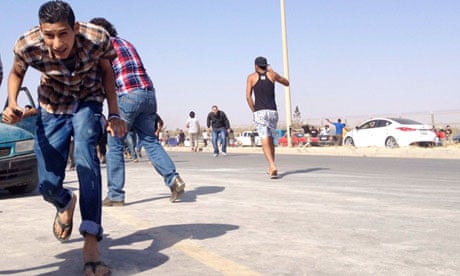Tucked away inside the battered Benghazi militia base where 31 people were killed in fighting last weekend is its greatest secret – a makeshift prison inside the toilets.
The Libya Shield militia who occupied the base, now pockmarked with bullet and shell holes, had converted toilet cubicles into prison cells, with metal grilles and doors welded on.
Scratched on to the wall of one cubicle are a line of numbers, ending in 147, but police now occupying the base say they don't know what became of the inmates. Until security forces stormed the base, the authorities had no idea the prison existed.
"I don't know what happened [to the detainees]," said First Officer Basim Omran, commander of riot police now guarding the base. "We didn't know this [jail] was here."
The weekend violence, which broke out when the militiamen opened fire on protesters, has acted as a catalyst for Libya's government.
Weary of two years of militia violence which has kept the country in chaos and stalled reform, the government ordered security forces to seize four Islamist militia bases in the city. But few here believe the militias will disband.
The army's chief of staff, Yousef al-Mangoush, resigned on Sunday, and his replacement, Salem al-Gnaidy, arrived in this eastern Libyan city to appeal for calm. At a dramatic press conference he displayed to the cameras another of the base's secrets – a homemade bomb consisting of an anti-tank mine with nails, bolts and a mobile phone taped to it. The implication was clear – such bombs have wreaked havoc across Benghazi for many months.
Gnaidy repeated calls for the militias to disarm, but with congress divided and its own regular forces weak, he lacks the means to enforce this.
Saturday's violence began when firing erupted as hundreds of protesters gathered outside the sprawling militia base demanding they disarm. The army's Thunderbolt special forces brigade arrived to restore order and itself came under fire, losing four men.
At the funeral of one of the dead at the bleak El Harawi cemetery, feelings were running high among soldiers who fired a salute with machine guns and anti-aircraft guns.
"The Libya Shield don't follow orders, we don't even know whose orders they follow," said Thunderbolt brigade lieutenant Said Alari.
His soldiers shouted that Qatar was responsible for backing the Islamists, a common complaint in a city that last month saw protesters burning a Qatari flag and an effigy of the emir. Qatar itself has put out a statement insisting it is not involved in Libyan politics.
Many here accuse the Islamists of having a political agenda. Islamist parties did badly at the ballot box in last July's elections, winning 10% of the vote, and critics think radical factions are trying to win power through the gun.
"You cannot convince me these people [Islamists] want a civil state," said Fathi Baja, a Benghazi professor and civil rights activist who is due to become Libya's ambassador to Canada. "They want to maintain a military arm. They want to be like the Iranian republican guard or the national guard in Saudi Arabia."
Islamists in turn accuse the government of continuing to employ officials from the Muammar Gaddafi era. In March, militias stormed congress. In April they used pickup trucks mounted with machine guns to blockade the justice and foreign ministries, demanding that ministers be replaced by "revolutionaries".
Militia attacks on the British and American consulates in Benghazi last year, the latter ending in the death of US ambassador Chris Stevens, have seen most foreigners leave the city. Many are now considering leaving Tripoli following an attack on the Italian ambassador's car this week and the wrecking of the French embassy with a car bomb in April.
The leaders of Libya Shield have vanished from view, but militiamen insist they support a democratic state.
"I am in the Shield to protect the revolution," insisted young militiaman Hamza Gihani, who worked part-time for Libya Shield, receiving a government salary. "Most of the people there were regular guys. There were only a few radicals."
For now Benghazi remains divided between militias and regular forces, mirroring a larger struggle in post-revolution Libya.
